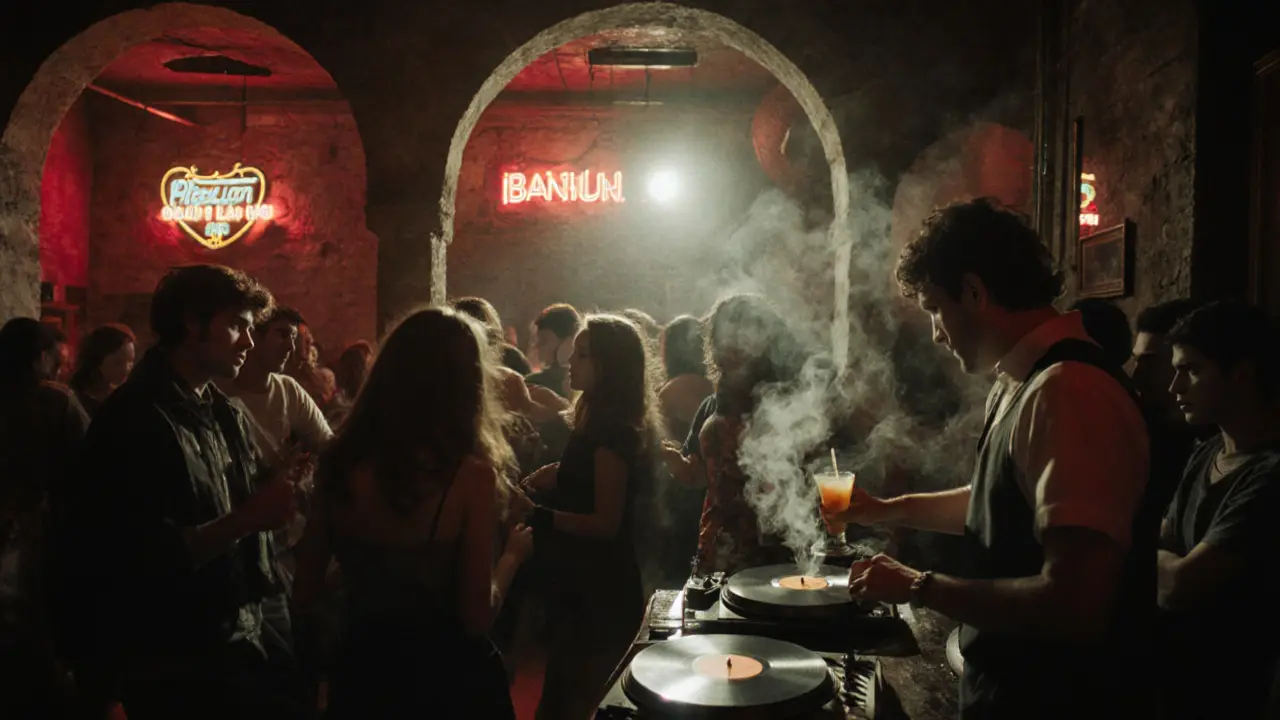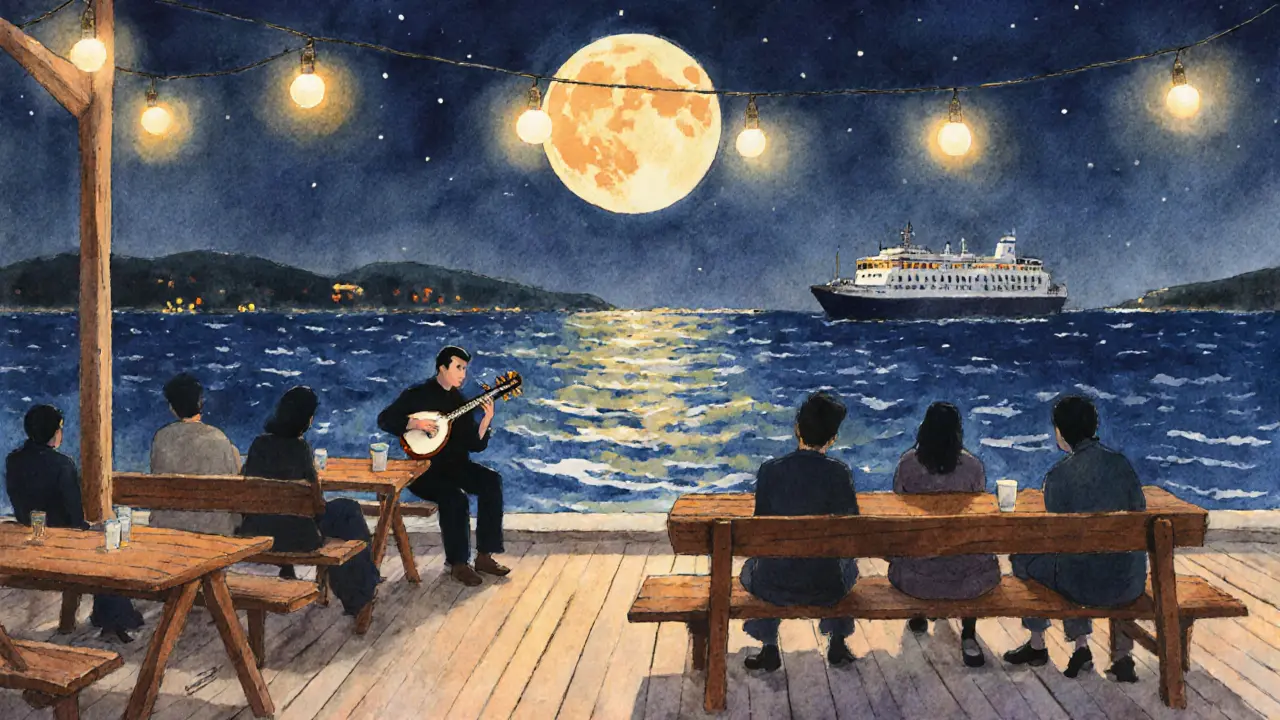When the sun sets over the Bosphorus, Istanbul doesn’t sleep-it transforms. The city’s nightlife isn’t just about loud music and flashing lights. It’s about sipping raki on a rooftop with the call to prayer drifting in the distance, dancing in a hidden basement club under centuries-old stone arches, or sharing meze with friends at 3 a.m. in a neighborhood where the streets still hum with life long after most cities have gone quiet.
Where to Start: The Old City After Dark
Many visitors assume Istanbul’s nightlife is all about Beyoğlu and Taksim. But the real magic starts in the historic districts. In Sultanahmet, the area around the Hagia Sophia and Blue Mosque quiets down after dinner, but the side streets come alive. Çiya Sofrası stays open until 2 a.m., serving Kurdish and Anatolian dishes that taste like home cooked by a grandmother who never sleeps. Walk five minutes down a narrow alley and you’ll find Leb-i Derya, a quiet wine bar tucked into a 19th-century Ottoman mansion. Their natural wines are sourced from small vineyards in Thrace and Cappadocia, and the owner often joins you at the table to tell stories about the grapes.
Don’t miss the rooftop terrace at Asitane. It’s not a club, but the view of the Blue Mosque lit up at night, paired with a glass of pear rakı, makes it one of the most peaceful-and unforgettable-nighttime experiences in the city. Locals come here to unwind, not to party. If you’re looking for calm, this is where you’ll find it.
Teenagers and Young Adults: The Heartbeat of Beyoğlu
If you’re under 25, Beyoğlu is your playground. İstiklal Avenue is packed with people, street performers, and neon signs, but the real action is in the side alleys. Bar 69 has been a staple since the 90s-low ceilings, vinyl records spinning, and a crowd that’s half tourists, half Istanbul kids who’ve been coming here since they could legally drink. The bouncer doesn’t check IDs unless you look like you’re 16. Most people are 19-23, and the vibe is pure, unfiltered Istanbul youth culture.
For those who want to dance, Reina is the classic. It’s been around since the 90s and still draws a mix of locals and international visitors. The music shifts from Turkish pop to house to old-school hip-hop, and the crowd doesn’t care about labels-they just move. If you’re not into big clubs, try Leb-i Derya’s younger sibling, Bar 1907. It’s a speakeasy-style bar behind a bookshelf, with cocktails named after Ottoman poets and a playlist that leans into Turkish indie rock.
Families and Older Visitors: Nightlife That Doesn’t Require a Crowded Dance Floor
Not everyone wants to be elbow-to-elbow in a club. And Istanbul understands that. In Kadıköy, on the Asian side, the nightlife is slower, smarter, and perfect for families or those over 40. Çarşı is a neighborhood with open-air cafés, live jazz on weekends, and kids playing soccer on the sidewalks until midnight. Yeni Lokanta serves Turkish tapas until 1 a.m., and the owner, a former opera singer, often plays piano after closing. No cover, no dress code, just good food and quiet music.
On weekends, the Kadıköy Sunday Night Market turns into a late-night food festival. Locals bring homemade pastries, grilled corn with za’atar, and fresh pomegranate juice. It’s not a tourist trap-it’s where Istanbul’s middle-aged and older residents spend their evenings. Bring your parents. Bring your kids. Everyone fits.

Hidden Gems: Where the Locals Go When They Don’t Want to Be Seen
Istanbul’s best nightlife isn’t on Google Maps. It’s whispered about. In the Balat district, tucked behind a bakery that opens at 5 a.m., you’ll find Çıngıraklı-a tiny bar with no sign, just a single red lantern. Inside, it’s all Turkish jazz, old photographs on the walls, and a bartender who remembers your name after one drink. You need a local to point you there. No one advertises it. No one needs to.
On the Princes’ Islands, the car-free archipelago just a 20-minute ferry ride from Kabataş, the nightlife is surreal. On Büyükada, Yasemin is a seaside café that turns into a live music venue after 10 p.m. No DJs. Just acoustic sets by local musicians playing Ottoman folk songs and modern Turkish ballads. You sit on wooden benches, watch the sea, and listen to songs that haven’t changed in 50 years. It’s not loud. It’s not flashy. But it’s the kind of night you remember forever.
What to Know Before You Go
Alcohol is legal in Turkey, but it’s not everywhere. Some neighborhoods, especially in conservative areas, have quiet rules. You won’t see open bottles on the street in Fatih or Üsküdar. Stick to licensed bars and restaurants if you want to drink outside.
Transportation runs late. The metro stops around midnight, but the İETT night buses (marked with an “N” on the front) run until 5 a.m. They’re cheap, safe, and go to every major nightlife district. Taxis are plentiful, but use BiTaksi or Uber instead of hailing one on the street-prices are fixed and you won’t get overcharged.
Dress code? Casual works everywhere. Shorts and sneakers are fine in Beyoğlu. In higher-end places like Reina or Leb-i Derya, no flip-flops or tank tops-but you don’t need a suit either.

When to Go: Seasons and Timing
April to October is peak season. The weather is perfect, the terraces are open, and the energy is electric. But don’t skip winter. December and January are quiet, but that’s when Istanbul’s real character shows. The crowds are gone, the prices drop, and the bars feel more like living rooms. You’ll find locals huddled around heaters, sharing stories over hot mulled wine.
Friday and Saturday nights are busiest. But if you want to feel like a local, go on a Tuesday or Wednesday. The clubs are less packed, the music is better, and the bartenders have time to talk.
What Not to Do
Don’t go to places that advertise “Istanbul’s #1 Club” on billboards. Those are tourist traps with overpriced drinks and fake crowds. Don’t try to force yourself into a scene that doesn’t fit your vibe. Istanbul’s nightlife isn’t one-size-fits-all. If you want silence, find it. If you want dancing, find it. The city has both-and they’re not far apart.
And don’t leave before 2 a.m. That’s when the real night starts.
Is Istanbul’s nightlife safe for solo travelers?
Yes, Istanbul is generally safe for solo travelers at night, especially in well-lit, popular areas like Beyoğlu, Kadıköy, and the Bosphorus waterfront. The city has a strong police presence in nightlife districts, and locals are often helpful if you look lost. Avoid isolated alleys after midnight, and stick to main streets. Night buses and ride-share apps like BiTaksi are reliable and safe.
Can I visit Istanbul’s nightlife if I don’t drink alcohol?
Absolutely. Istanbul has a rich non-alcoholic nightlife. Many bars serve excellent Turkish coffee, fresh fruit juices, and non-alcoholic cocktails made with pomegranate, rosewater, or hibiscus. Places like Çiya Sofrası and Yeni Lokanta offer full meals and live music without any pressure to drink. The city’s tea houses and dessert spots stay open late too-perfect for a sweet ending to your night.
Are there family-friendly nightlife options in Istanbul?
Yes. In Kadıköy and Beşiktaş, many cafés and open-air restaurants stay open past midnight with no music or loud crowds. The Sunday Night Market in Kadıköy is perfect for families-it’s safe, lively, and full of food stalls. Even in Beyoğlu, places like Bar 69 have high chairs and kids’ menus. Istanbul doesn’t shut down for families; it adapts.
What’s the best time to visit Istanbul for nightlife?
April through October offers the most options, with outdoor terraces and festivals. But if you want a quieter, more authentic experience, visit in November or March. The weather is still mild, the crowds are gone, and locals are more relaxed. Winter nights in Istanbul feel intimate, not impersonal.
Do I need to make reservations for Istanbul’s nightlife spots?
For big clubs like Reina or Reina’s sister venue, Zorlu PSM, it’s smart to book ahead on weekends. But for most bars, cafes, and hidden spots-especially in Kadıköy and Balat-you can just walk in. The charm of Istanbul’s nightlife is that it’s rarely booked solid. If you’re going somewhere popular, ask your hotel or a local for advice the day before.
